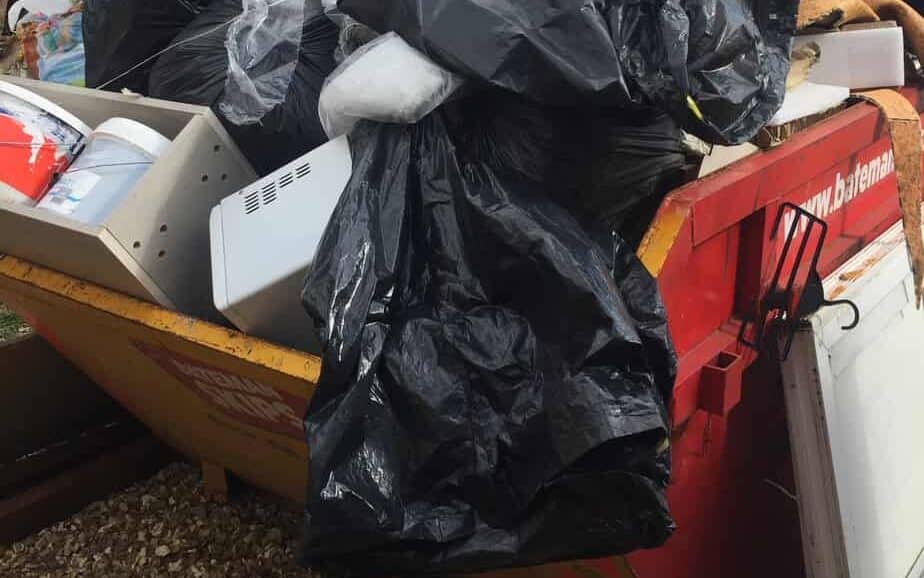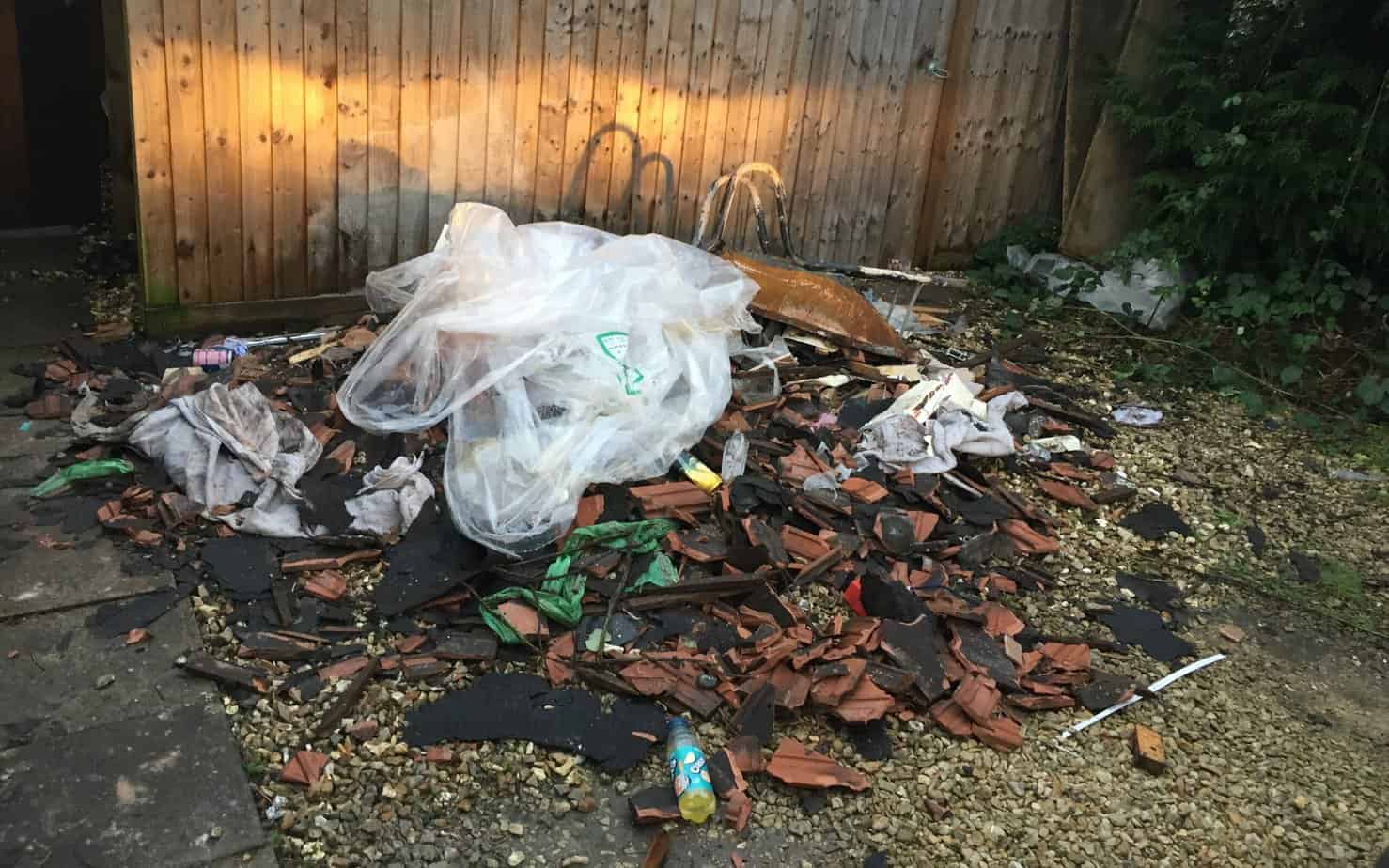I dropped a professional whoopsy this week. I was responsible for organising a lighting refurbishment across a commercial building and I did not get it clarified in writing who was responsible for the rubbish removal. I assumed the new lighting supplier was taking care of it, they assumed it was me. Either way, I was left footing the huge bill for the waste removal after the construction project.
I thought I would cheer myself by helping others avoid the same mistake and answering the question, is rubbish removal included in a rewire? Whilst the post answers this question specifically I have also included lots of general information to help all homeowners be in the know when it comes to hiring tradesmen and who is responsible for the clean-up afterwards!

Is Rubbish Removal Included in a Rewire?
Whenever I carry out a rewire, rubbish removal is included in the cost of the work. The majority of electricians will operate on the same principle that if they create a mess they will clean it up. This is an important distinction as rewires often involve multiple different trades so deciding who is responsible can get a little tricky.
Once the actual rewiring has been completed, it is the turn of the plasterers and painters to come in to make good to the walls and redecorate. At this point, the electricians have usually finished their work and left having already tidied up their mess. The plasterer is responsible for removing any rubbish they create and so is the painter.
In this multi-trade type of construction work, there is inevitably some toing-and-froing over who is responsible for what mess. The best way homeowners can protect themselves is to use professional local tradesmen that come recommended by a friend and to get it in writing, in advance, that the tradesmen is responsible for rubbish removal as well. As readers will see later on, the cost of rubbish removal is huge so assigning responsibility in advance is vital!
Do Tradesmen Clean Up After Themselves?
I’ll be the first to admit that electricians can often be guilty of leaving little cable offcuts dotted around the floor. However, electricians like the majority of professional tradesmen, will clean up after themselves. Whether or not this clean-up is up to the homeowner’s standards is another matter.
Like all construction work, a rewire can get pretty messy. In my experience dust is the biggest culprit as it tends to drift throughout the house and cling to all the surfaces. While all electricians will tidy up after themselves this won’t extend to going through the house with a bucket and cloth and actually wiping down all the surfaces.
Most homeowners will find that the house needs a thorough cleaning once the rewire, or construction work, is completed. If the owner wants to get a cleaning company in to give the entire house a blitz, that is an option. The customer could try arranging in advance for the entire clean-up to be added to the quote, but this is not something I’ve ever seen, and in my opinion, would be more hassle than it’s worth.

How Can I Get Rid of Rubbish Left Behind after Construction Work?
A significant factor that is often overlooked in construction projects, such as full house rewires, is how to get rid of the waste created. Local councils are now much stricter over the amount of waste that can be taken to the local recycling depot without it being classed as construction waste. In my home town of bristol, the council restricts the amount of rubble allowed to 6 x 25kg bags. This is not much at all when you consider the weight of bricks!
Deciding in advance (and getting a written agreement) on who is responsible for disposing of the waste is vital and something I myself have been caught out on a few times in my career as an electrician. As mentioned at the start, I was left holding the bill for some lights to be disposed of after I’d assumed getting rid of the old lights was part of the lighting quote from the supplier. Big mistake.
Below is a table showing prices to have waste removed by skip. This is a company local to me, but similar prices will be seen all around the country. You can see from these costs why deciding who is footing the bill in advance is so important!
Table showing estimate of skip hire costs to have construction waste disposed of
| Size of skip | Cost of skip |
|---|---|
| 2 Cubic Yard | £186 |
| 4 Cubic Yard | £216 |
| 6 Cubic Yard | £282 |
| 8 Cubic Yard | £312 |
| 10 Cubic Yard | £342 |
| 12 Cubic Yard | £372 |
| 16 Cubic Yard | £420 |
| 20 Cubic Yard | £492 |
For more info about what the size of skips actually means this is a handy resource. It’s also worth noting that these are prices for placing the skip off-road. If the skip needs to be placed on the road then permits need to be obtained by the council and the skip company charges an additional £87 for this.
Do Waste Materials get Recycled After Construction Work?
Segregation of waste is an important topic within the construction industry from a small domestic rewire, up to a large construction site. Waste should be separated out and disposed of in as environmentally friendly manner as possible. The problems arrive when the waste materials have all been mixed together (in a large skip for example) and the whole lot goes to landfill.
Below is a table showing the typical categories that waste is separated into from construction projects.
| Waste Segregation | Notes |
|---|---|
| Cardboard | |
| Wood | |
| WEEE | Stands for Waste Electrical and Electronic Equipment (ie electrical cables and accessories) |
| Metal | Can be paid for scrap metal so worth checking |
| Plastic | |
| Asbestos | Very strict rules on Asbestos disposal as it’s very bad for health to breathe in and usually costs a lot to dispose of large amounts. |
| Rubble | Items such as old bricks and stone removed from the ground |
| General | All other items. General waste is kept as small amount as possible as nearly always ends up in landfill. |
We should make a special mention of the recycling of metals, particularly those that carry value. Scrap metal such as copper from cables, pipework or old water tanks carries a surprising amount of value at scrap metal dealerships. There is usually a separate waste bin for these materials as instead of paying to have them disposed of sometimes payment is made to the construction company instead.
As a homeowner having work carried out, such as a rewire, the amount of copper in the cable is negligible in the grand scheme of things (in my opinion, certainly nothing worth arguing over). If the homeowner really wants all the scrap cable or copper pipes after construction work this should be made clear in advance.
If the homeowner tries to make claim on the scrap metal after the work is done, they are likely to be met with the response that the money earned from the recycled materials was factored into the job quote. A pretty difficult situation to find yourself in. Like has come up many times in this post, get it written down in advance who gets the scrap metal if this is something you want to keep!
Final Thoughts
As eluded to, the best advice when asking if rubbish removal is included in a rewire is for the homeowner to get this clarified in writing in advance. Most electricians and other tradesmen will clean up after themselves as part of being a professional, courteous construction worker but there are some rogues out there. Having written proof in advance is a great way to avoid being left footing a hefty bill adding insult to injury.

